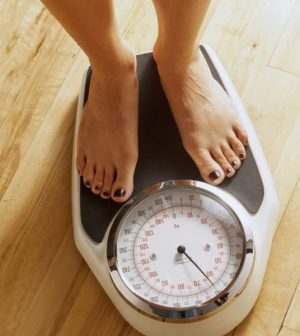- Could Your Grocery Store Meat Be Causing Recurring UTIs?
- Are You Making This Expensive Thermostat Error This Winter?
- Recognizing the Signs of Hypothyroidism
- 10 Strategies to Overcome Insomnia
- Could Artificial Sweeteners Be Aging the Brain Faster?
- Techniques for Soothing Your Nervous System
- Does the Water in Your House Smell Funny? Here’s Why
- Can a Daily Dose of Apple Cider Vinegar Actually Aid Weight Loss?
- 6 Health Beverages That Can Actually Spike Your Blood Sugar
- Treatment Options for Social Anxiety Disorder
The Right Way to Weigh Yourself

The scale can be your best friend — or your worst enemy — when you’re on a diet.
But whether or not you like what you see, a scale isn’t the only — or the best — way to track your progress. Rather than looking for a particular number on a scale, measure success in more meaningful ways.
Changes in your body mass index, or BMI (a ratio of your weight and height), is one good indicator. Use an online calculator to plug in your stats. As your weight drops, you should see your BMI go down, too. Note that a normal BMI range is between 18.5 and 24.9, while 25 to 29.9 indicates overweight, and 30 or greater signals obesity.
Because a large waist circumference puts you at greater risk of diabetes, heart disease and other health problems, you can also chart your progress with a tape measure. Use it to track the inches around your chest, hips, thighs, calves and upper arms, as well as your middle.
How your clothes fit is an easy way to know if you’re dropping pounds. Grab a tight pair of pants from your closet and try them on every two weeks, noting any changes.
If you’re still focused on using the scale, make your weight-loss expectations a realistic one-half to one pound a week, to avoid being discouraged by the number you see.
Also, keep in mind that Monday isn’t the best day for a weigh-in. Because people tend to eat more on the weekends and less during the week, Friday morning is a better time to get on the scale.
More information
The U.S. National Heart, Lung, and Blood Institute has an easy-to-use online BMI calculator that you can even download to your smartphone.
Source: HealthDay
Copyright © 2026 HealthDay. All rights reserved.










